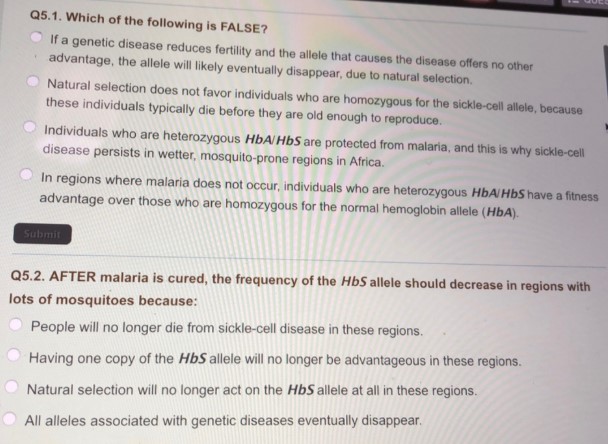QQuestionAnatomy and Physiology
QuestionAnatomy and Physiology
# Q^5.1. Which of the following is FALSE?
- If a genetic disease reduces fertility and the allele that causes the disease offers no other advantage, the allele will likely eventually disappear, due to natural selection.
- Natural selection does not favor individuals who are homozygous for the sickle-cell allele, because these individuals typically die before they are old enough to reproduce.
- Individuals who are heterozygous $\boldsymbol{H b A} / \boldsymbol{H b S}$ are protected from malaria, and this is why sickle-cell disease persists in wetter, mosquito-prone regions in Africa.
- In regions where malaria does not occur, individuals who are heterozygous $\boldsymbol{H b A} / \boldsymbol{H b S}$ have a fitness advantage over those who are homozygous for the normal hemoglobin allele (HbA).
## Q^5.2. AFTER malaria is cured, the frequency of the $\boldsymbol{H b S}$ allele should decrease in regions with lots of mosquitoes because:
- People will no longer die from sickle-cell disease in these regions.
- Having one copy of the $\boldsymbol{H b S}$ allele will no longer be advantageous in these regions.
- Natural selection will no longer act on the $\boldsymbol{H b S}$ allele at all in these regions.
- All alleles associated with genetic diseases eventually disappear.
Attachments

6 months agoReport content
Answer
Full Solution Locked
Sign in to view the complete step-by-step solution and unlock all study resources.
Step 1: Identify the false statement regarding sickle-cell alleles and malaria.
The given statements are as follows:
Step 2
If a genetic disease reduces fertility and the allele that causes the disease offers no other advantage, the allele will likely eventually disappear, due to natural selection.
Final Answer
Statement 1 in Q^5.1 is true, Statement 2 is true, Statement 3 is true, and Statement 4 is false. Statement 1 in Q^5.2 is true, Statement 2 is true, Statement 3 is false, and Statement 4 is generally false.
Need Help with Homework?
Stuck on a difficult problem? We've got you covered:
- Post your question or upload an image
- Get instant step-by-step solutions
- Learn from our AI and community of students